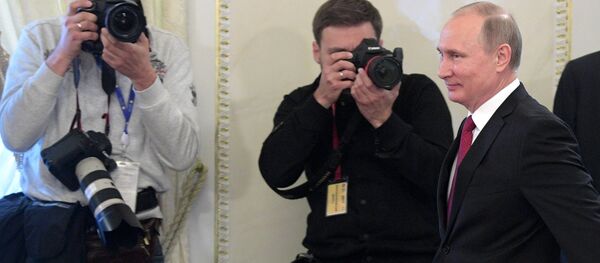Du is one of Beijing's Chaoyang district masses, known in Chinese as the Chaoyang qunzhong, who have been mobilized by the government to act as the front line of security.
The role of these grass-roots eyes and ears may be enshrined in law soon, as the first draft of a new law on "intelligence" says that "professional methods" should be combined with the "mass line," a phrase which has been interpreted by many as referring to volunteers like Du.
This eye-catching phrase is just one of the 28 articles in the draft, open to public consultation until June 4, that cover who should lead intelligence gathering, the rights of the intelligence agencies and the protection of agents and their families.
Though the draft has been released on the website of China's top legislature, the National People's Congress, with little fanfare, the law has still aroused discussion in the media due to its significance as the country's first attempt to legally regulate intelligence gathering.
"There was no law to govern intelligence work before and it was mostly carried out following ministry documents. The coming law is of breakthrough importance in legislation and means a lot to maintaining national security," noted Wang Qiang, a specialist in non-war military actions at the National Defence University of the People's Liberation Army.
An urgent matter
The introduction to the draft says that the law aims to link up with China's National Security Law, Anti-espionage Law and Anti-terrorism Law to maintain national interests, including sovereignty, unity, and independence, territorial integrity and the people's welfare.
It also says that the law will give the authorities the legal right to monitor and investigate Chinese and foreign nationals and organizations to protect national security if passed.
To many Chinese people concerned with national security issues, a legal framework for intelligence work is long overdue, as seen from the feedback of netizens on Sina Weibo.
"The importance of intelligence to national security goes without saying. Besides, it [the law] will put another layer of armor for people working covertly for intelligence," a netizen named Shouwang told the Global Times.
"Even though now is an era of peace, rival powers both overseas and at home have never disappeared and neighboring regions are in turmoil. Spies never stop collecting intelligence in China and they will find every chance to stir up trouble," said Li Jie, a Beijing-based military expert. "The national security situation is tense."
In recent years, State security organs have cracked down on many cases involving intelligence that shocked the public. In one case in South China's Guangdong Province, an NGO with the stated aim of defending migrant workers' rights was found to have received funding from overseas, and police said the group had incited illegal strikes.
"It is very easy for those who are weak and easily influenced to get swayed and do something harmful to the country in conspiracy with overseas forces," said Li, "Establishing a law to regulate intelligence shows China will pay more attention to this area."
"Unlike traditional struggles, untraditional struggles in national security, like anti-terrorism, are rather complex, and require enormous quantities of intelligence data," noted Wang. "Once it is passed, the law will fill a vacancy in the legal system concerning national security. And it will be of profound influence."
"It will integrate all the forces and make our intelligence work more effective while reducing waste of resources."
For the people
The parts of the law which have aroused the greatest interest in the media are the articles which refer to the role of individuals.
Article 7 and 8 say that intelligence work should be carried out according to the law and safeguard human rights, and the country will protect people and organizations that support intelligence work and reward those who make significant contributions.
Article 19 says that a management system regarding the enrollment, selection, examination, training and treatment of intelligence workers will be established. Article 21 says the personal safety of staff with State intelligence organs, their partners, and all their near relatives will be protected.
Wang sees these articles as a major breakthrough because for a long time "the rights and interests of intelligence workers were not properly protected due to the particularity of their job and the special methods they adopt to carry out their work."
"There are a lot of people who work in obscurity and cannot reveal their identity, and never received the honors they deserved from the country," said Wang, "Now with the coming law, their rights and those of their family members could be protected. It is progress in both intelligence and society."
The law will also be closely connected with ordinary people, Wang noted, because the draft mentions the training of intelligence workers, their connection with the public and the partnership between agencies and individuals and organizations in society.
"At college, majors might be opened for intelligence," analyzed Wang. At present, though public security and State security organs have their own channels to train talents, they are mostly inserted in the training systems for other talents. "With the law, more will be invested in the educational resources to ensure the quality and output of talents in this field."
"If this is true, it will be a good chance for ordinary people who have enthusiasm for serving the country to join in. They will know where to enter the field," said Wang.
Moreover, "the mass line" is mentioned several times in the draft, as "intelligence work will be carried out by combined professional and mass line methods." This mention of ordinary volunteers in a national law has led netizens to jokingly speculate about the role of these retirees in intelligence gathering.
Commenting on a recent report about the draft on Sina Weibo, a netizen named Navy-Pilot exclaimed: "Haven't those Chaoyang qunzhong always been legal?" Many netizens joked that the Chaoyang masses are the world's fifth biggest intelligence agency after the CIA, the KGB, Mossad and MI6.
"It is a bit entertaining when people mention the Chaoyang masses today. But seriously, they play an important role in maintaining our national security," Wang explained, "Relying on ordinary people has been a highlight of China's intelligence. Significant intelligence is based on enormous data collected by people from every corner, which cannot be done alone by professionals."
"Some clues they report, seemingly about social order, actually reflect struggles between China and its rivals," added Wang.
"It is of great meaning too that the 'mass line' is written in the law this time. If passed, if the tens of thousands of volunteers mobilize every citizen around them to keep eyes open for abnormal signs in daily life, then everyone can contribute to national security while keeping themselves safe."
According to Li, the draft is encouraging all of society to join intelligence efforts.
Conservative law
Wang says, the intelligence law is part of China's overall plan to "legalize" its national security measures.
In 2014, Chinese President Xi Jinping raised the concept of "overall national safety" and declared that China will construct a national security system to include 11 kinds of safety, including safety concerning politics, military, economy, technology and nuclear facilities.
In November 2014, China implemented its first Anti-espionage Law. In 2015, China published its new National Safety Law to cover the overall safety concern. In December 2016, China's top legislature passed the country's first Anti-terrorism Law.
"The anti-espionage law is to 'defend' while the intelligence law is to 'attack,'" said Wang, "It concerns not only national security but also national interests, and covers various aspects of the economy and life, including intellectual property rights."
"Intelligence is subordinate to State security, but it runs through all the safety areas and is thus of extreme importance. Once legalized, it will smooth the channels to implement the overall national security concept and make the job more rational," Wang noted.
After the draft was released, a few netizens expressed their doubts about the necessity of making a law for intelligence, saying that it may affect the freedom of individuals.
"It is international practice to have an intelligence law, given the growing complexity of the safety situation. China's is already very conservative, compared to countries like the US," said Wang.
This article was written by Xu Ming and originally published in the Global Times.






